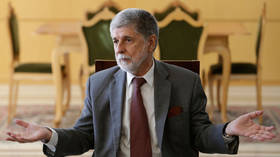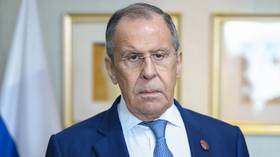Russia to discuss Ukraine peace talks with BRICS partners
Moscow was not invited to the Saudi-hosted peace talks that brought some 40 nations together, including four BRICS members
Moscow plans to hold consultations with other members of the BRICS group of nations, in the wake of the Ukraine peace talks hosted over the weekend by Saudi Arabia, Russian Deputy Foreign Minister Sergey Ryabkov told TASS on Sunday. Excluding Russia, all BRICS nations – China, India, Brazil and South Africa – had been urged to take part in the event.
“As for the BRICS partners that were invited and went there… there is an understanding that we and other BRICS members … will hold a dialogue and share relevant opinions in the wake of the events in Jeddah,” Ryabkov said, referring to the weekend talks in the Saudi port city.
The diplomat also said that, although Russia was left out, there was nonetheless some sense to the talks and the participation of the BRICS members might have been beneficial in terms of introducing Kiev’s Western backers to some “common sense.”
“We are yet to understand what exactly happened in Jeddah,” the deputy FM said, adding that it would be expedient to get a grasp of “the real balance [of power] and alignment [of forces]” at this meeting and Russia would discuss these issues with its BRICS partners.
Saudi Arabia hosted the two-day talks in Jeddah on August 5 and 6. The meeting involved a total of 42 nations, including both the US, the UK and the EU nations, which openly back Ukraine in the conflict, as well as China, India, Brazil, Türkiye, Indonesia and South Africa, which took a more balanced approach to the ongoing standoff between Moscow and Kiev.
According to various media reports, the participants are believed to have agreed that any solutions to the conflict should be based on “respect for the territorial integrity and sovereignty of Ukraine” and on the primacy of the UN Charter. Riyadh also plans to propose creating working groups for specific issues, including the global impact of the war, nuclear safety or food security.
This is the second such meeting after a similar event in Copenhagen, which did not involve Russia either. Yet, unlike in Copenhagen, Kiev no longer pushed for its so-called Zelensky peace formula, which demanded Russia withdraw from all territories of Ukraine within its 1991 borders, the Wall Street Journal (WSJ) reported, citing its sources. Moscow has previously dismissed the plan tabled by Zelensky as unrealistic.
A senior European official told the WSJ that, at this weekend’s talks in Jeddah, the Ukrainian delegation didn’t insist that other nations accept its plan. Neither did it press the point about Russian troop withdrawal, he said, adding that other nations, in turn, didn’t raise the issue.
During the meeting, China once again presented its own 12-point peace plan, first unveiled by President Xi Jinping in February, the WSJ reported. The proposal was opposed by Western diplomats, who claimed it would just “freeze” the conflict, it said.
Back in February US officials dismissed the Chinese proposal, saying it would benefit only Russia. NATO Secretary-General Jens Stoltenberg claimed China doesn’t have much “credibility” on the issue because it has declined to condemn Russia for attacking Ukraine.
Ahead of the Saudi-hosted summit, Moscow criticized the event, saying that Kiev’s Western backers are merely seeking to “impose” the Zelensky formula on the nations of the Global South, all while turning a blind eye to the plight of ethnic minorities in Ukraine under Kiev’s rule.
The head of the Brazilian delegation to a Saudi-hosted summit also said ahead of the meeting that any real talks about peace in Ukraine ought to involve Russia.







Comments are closed.